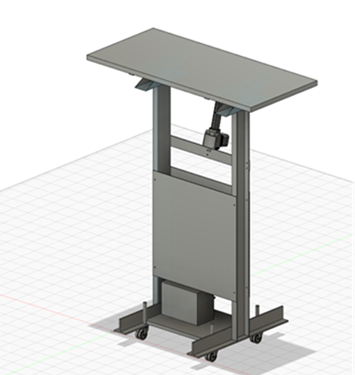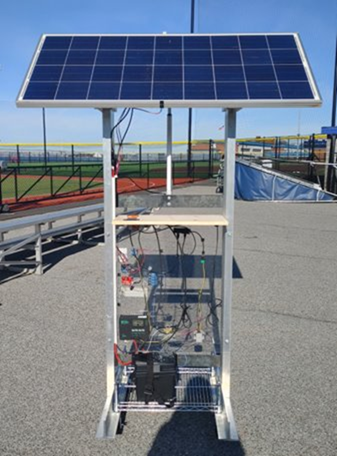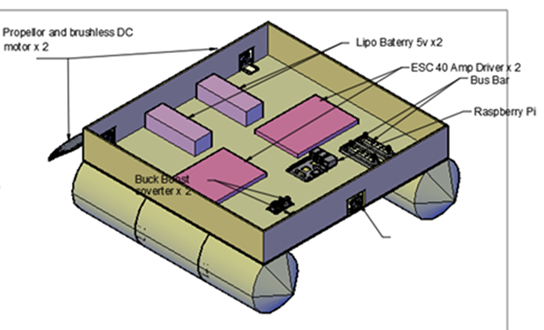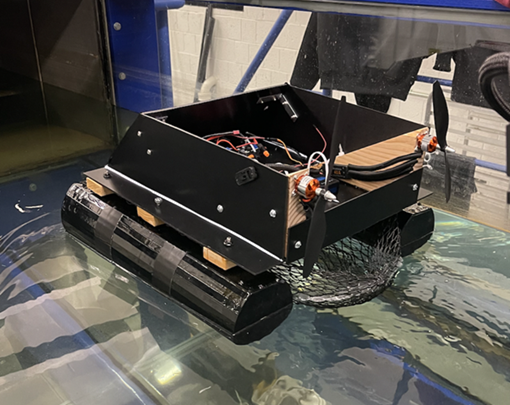
As an Electrical Engineering major, you will gain in-depth classroom and practical knowledge about power generation, control and use. When you graduate, you will be prepared to design, service and operate electrical systems and electrical power systems.

Accreditation
The Electrical Engineering program is accredited by the Engineering Accreditation Commission (EAC) of ABET, under the commission's General Criteria and Program Criteria for Electrical and Electronics Engineering.
Academic Program
Electrical Engineering courses focus on electrical science, math and the sciences, and teach students to think abstractly. Learning in Electrical Engineering goes well beyond the classroom. You will spend your time in labs, designing, building and testing ways to generate and deliver power, and analyzing the results. Increasingly, courses focus on sources of renewable energy and its impact on the maritime and transportation industries.
Degree Awarded
Bachelor of Engineering
Professional Experiences Available
- U.S. Coast Guard Deck License
- U.S. Coast Guard Engine License
- Intern Option
See the Career Options and Educational Pathways tab for more information.
Degree Curricula and Flowcharts
The Electrical Engineering Degree Curricula and Pre-Requisite Flowcharts may be found at the link below.
Degree Curricula and Flowcharts
Program Educational Objectives
The objectives for this program are for graduates to:
- become engineers who have the ability to practice the design, service, or operation of electrical systems or electrical power systems, and
- have the ability to take professional leadership positions that require an extensive engineering background.
Student Outcomes
Electrical Engineering graduates of Maritime College will possess:
- an ability to identify, formulate, and solve complex engineering problems by applying principles of engineering, science, and mathematics
- an ability to apply engineering design to produce solutions that meet specified needs with consideration of public health, safety, and welfare, as well as global, cultural, social, environmental, and economic factors
- an ability to communicate effectively with a range of audiences
- an ability to recognize ethical and professional responsibilities in engineering situations and make informed judgments, which must consider the impact of engineering solutions in global, economic, environmental, and societal contexts
- an ability to function effectively on a team whose members together provide leadership, create a collaborative and inclusive environment, establish goals, plan tasks, and meet objectives
- an ability to develop and conduct appropriate experimentation, analyze and interpret data, and use engineering judgment to draw conclusions
- an ability to acquire and apply new knowledge as needed, using appropriate learning strategies.
LEARN MORE ABOUT THE ELECTRICAL ENGINEERING PROGRAM
Testing Testing
Electrical Engineering Enrollment and Degree Data
Calendar Year | 1st Enrollment Year | 2nd Enrollment Year | 3rd Enrollment Year | 4th Enrollment Year | 5th Enrollment Year | B.E. Degrees Awarded |
|---|---|---|---|---|---|---|
| 2023 | 19 | 17 | 24 | 15 | 2 | 26 |
| 2022 | 22 | 24 | 25 | 12 | 6 | 18 |
| 2021 | 37 | 35 | 19 | 14 | 5 | 16 |
| 2020 | 45 | 25 | 22 | 14 | 1 | 20 |
| 2019 | 36 | 21 | 18 | 13 | 4 | 25 |
| 2018 | 32 | 23 | 19 | 15 | 11 | 21 |
| 2017 | 28 | 27 | 19 | 17 | 13 | 22 |
| 2016 | 26 | 31 | 21 | 23 | 9 | 30 |
| 2015 | 37 | 24 | 32 | 25 | 12 | 20 |
| 2014 | 33 | 31 | 33 | 15 | 9 | 14 |
| 2013 | 32 | 36 | 18 | 12 | 11 | 11 |
| 2012 | 38 | 27 | 17 | 11 | 5 | 15 |
For more information, contact the Office of Admissions.
| Name | Title / Position | Primary Program | Phone | Office | |
|---|---|---|---|---|---|
| Aragon, Roland | Instructional Support Technician | Engineering Department Staff | Email me | 718.409.7430 | S&E 2-57B |
| Balasubramanian, Hari | Assistant Professor | Naval Architecture | Email me | 718.319.1143 | S&E 2-39 |
| Breglia, Joseph | Senior Lecturer | Facilities Engineering | Email me | 718.409.7429 | S&E 2-54 |
| Burke, Richard | Emeritus Professor | Naval Architecture | Email me | 718.409.7411 | |
| Cui, Weili | Associate Professor | Mechanical Engineering | Email me | 718.409.3538 | S&E 1-56 |
| Delo, Carl | Professor | Mechanical Engineering | Email me | 718.409.7412 | S&E 2-44 |
| Feng, Fei | Assistant Professor | Electrical Engineering | Email me | 718.409.7416 | S&E 1-20 |
| Fountain-Toomer, Deborah | Office Manager, Assistant to the Chair | Engineering Department Staff | Email me | 718.409.7411 | S&E 2-35 |
| Fridline, Daniel | Associate Professor, Chair of Engineering | Mechanical Engineering | Email me | 718.409.7414 | S&E 2-36 |
| Gerr, Dave | Senior Lecturer | Naval Architecture | Email me | 718.409.5007 | S&E 2-39 |
| Gorivodsky, Dmitry | Visiting Lecturer | Engine License | Email me | 718.409.7411 | S&E 2-37 |
| Gosselin, Kathryn | Associate Professor, Coordinator of Undergraduate Studies and Advising | Mechanical Engineering | Email me | 718.409.1769 | S&E 2-46 |
| Grosso, Saverio | Lecturer | Facilities Engineering | Email me | 718.409.7351 | S&E 2-52 |
| Gruffi, Robert | Adjunct | Engine License | Email me | 718.409.7411 | |
| Gyves, Thomas | Associate Professor | Mechanical Engineering | Email me | 718.409.7426 | S&E 2-48 |
| James, Jemerson | Assistant Professor | Naval Architecture | Email me | 718.409.5007 | S&E 2-38 |
| Jeon, Jaeseok | Associate Professor | Electrical Engineering | Email me | 718.409.5560 | S&E 1-16 |
| Kalbfell, Robert | Adjunct | Engine License | Email me | 718.409.7411 | |
| Kidd, Bob | Associate Professor | Mechanical Engineering | Email me | 718.409.7425 | S&E 2-41 |
| LaFleur, Ronald | Associate Professor | Mechanical Engineering | Email me | 718.409.7420 | S&E 2-47 |
| Liu, Ziqian | Professor | Electrical Engineering | Email me | 718.409.7423 | S&E 1-21 |
| Martinez, Alberto | Instructional Support Technician | Engineering Department Staff | Email me | 718.409.7413 | S&E 2-40 |
| Mellusi, Anthony | Instructional Support Technician | Engineering Department Staff | Email me | 718.319.1186 | S&E 2-40 |
| Mohamed, Mohamed | Assistant Professor | Electrical Engineering | Email me | 718.409.5336 | S&E 1-17A |
| Munsch, Charles | Professor | Naval Architecture | Email me | 718.409.7417 | S&E 2-45 |
| Roeckle, Roland | Adjunct | Engine License | Email me | 718.409.7411 | |
| Strez, Catherine | Associate Professor | Marine Engineering | Email me | 718.409.7415 | S&E 2-42 |
| Vukelic, John | Instructional Support Technician | Engineering Department Staff | Email me | 718.409.7439 | S&E 2-40 |
| Winfrey, Leigh | Professor | Mechanical Engineering | Email me | 718.319.2046 | S&E 2-43 |
| Fall Semester | Fall Semester | Spring Semester | Spring Semester | NOTES | ||
|---|---|---|---|---|---|---|
| Regimental New Student (Campus Resident) | Traditional Student (Campus Resident) | Regimental Student (Campus Resident) | Traditional Student (Campus Resident) | |||
| In-State | $14,155.50 | $13,195.50 | $13,025.50 | $12.945.50 | Rates apply to eligible veterans and their dependents. | |
| In-Region | $15,925.50 | $14,965.50 | $14,795.50 | $14,715.50 | ||
| Out-of-Region | $19,605.50 | $18,645.50 | $18,475.50 | $18,395.50 | ||
| International | $20,807.50 | $19,847.50 | $20,135.50 | $20,055.50 |
Capstone Design
Electrical Engineering students at Maritime College's School of Engineering participate in an open-ended senior design project in interdisciplinary teams as part of their capstone design experience, which helps them comprehend and carry out the entire design process. Seniors in electrical engineering can apply their undergraduate knowledge to real-world scenarios through rigorous capstone design projects, which fall into various main categories: industry sponsored, competition, and research. Interdisciplinary teams collaborate with academic supervisor and project stakeholders (where applicable) to take ideas from the drawing board through the manufacturing of prototypes, testing, and assessment to ensure that their solutions are valid. By working in diverse teams, students develop leadership skills and group dynamics, learn how to tackle project management challenges while meeting weekly deliverables and deadlines, and develop strong analytical and communication skills. As Maritime students, our seniors also take professional practice, economics, safety, ethics, and other factors into account when designing solutions. At the end of the semester, students showcase and pitch their final design to the entire campus, invited guests, and their peers. This is an excellent opportunity for the campus community to see how their project was conceptualized by the Maritime College Electrical Engineering students.
Recent Projects
Dual-axis Photovoltaic System with Maximum Power Point Tracking


Autonomous Surface-Water Cleaning Robot


